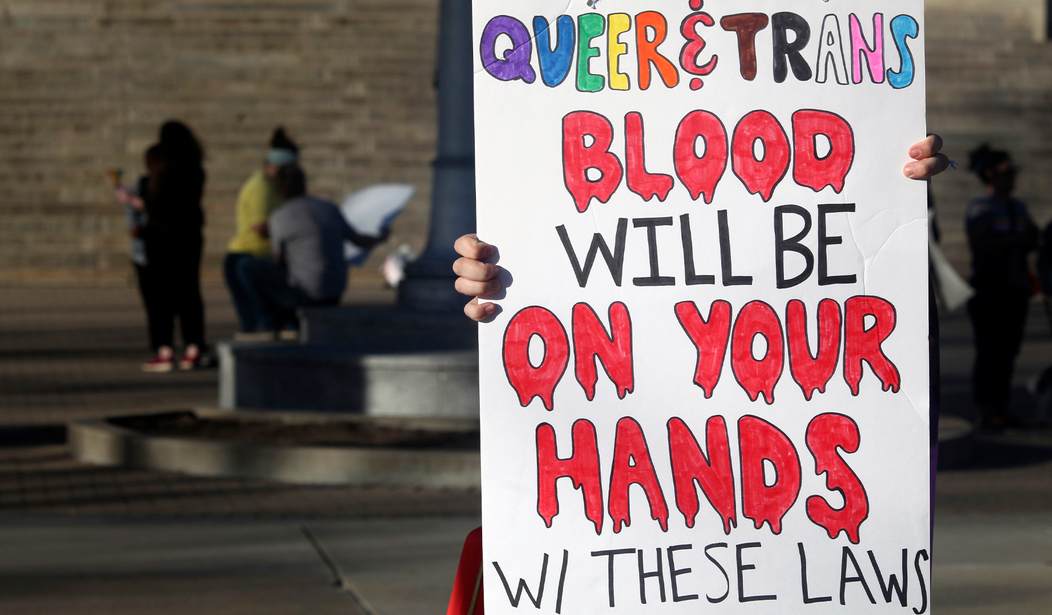The loving and liberal German Parliament recently passed legislation that allows for gender transition enforced on children by their parents and the state from birth and also provides for five-figure fines for “deadnaming” — the alleged transgression of referring to a transed individual by their birth name.
Related: Undercover Video Exposes Pornhub’s Child-Grooming Strategy
Via Reduxx (emphasis added):
The German Parliament, or Bundestag, passed one of the world’s most far-reaching sex self-determination policies on April 12, despite protests from women’s rights campaigners. The Self-Determination Act (SBGG) establishes ‘gender identity’ as a protected characteristic and allows parents to change the sex marker on their children’s documents from birth.*
Supported by Chancellor Olaf Scholz’s three-party coalition and promoted and supported by the Socialist Democratic Party (SDP), the SBGG also creates the potential for citizens to be fined up to €10,000 (approx. $10,800 USD) for revealing a person’s given name and birth sex without their permission – an action that trans activists staunchly oppose and refer to as ‘deadnaming.’
But arguably the most troubling aspect of the law relates to a portion of the bill which permits parents to alter the recorded sex of children beginning from birth. From the age of five years old, it allows for name and sex changes if there is “mutual consent” between the child and their parents.
According to a description of the bill on the Bundestag’s official website, the Self-Determination Act was designed “to implement a core idea of the Basic Law, the protection of gender identity, by giving people the opportunity to change their gender entry and first name without discrimination.”
Germany's Socialist Democratic Party has published a video featuring trans-identified males in promotion of a gender self-identification bill.
— REDUXX (@ReduxxMag) August 27, 2023
The draft bill, which passed the Cabinet on August 23, includes a $10,800 fine for "deadnaming." pic.twitter.com/mgKoC0uxnS
*For sane people, there are obvious multiple moral pitfalls to this legislation, but let’s take Social Justice™ dogma at face value for a moment, for the sake of argument: the insistence is that children themselves know best what gender they actually are and so it’s not up to the parents or any other authority figures to make that decision for them. How is it possible, then, that a baby that literally can’t talk, that just emerged from a cocoon of blackness and arguably isn’t even sentient yet, could possibly consent to having its gender changed on government documents?
The answer is glaringly obvious. As Blaire White and others have pointed out in the past, transgender children are like vegan cats in that anyone with eyes to see can suss out who’s making the decisions. It’s not the kids and it’s not the cats.
But I wonder what a trans child-groomer would say in defense of this bill, given the clear internal contradiction of their own ideology.
The Harry Potter actor, for example, has previously demanded that we “trust kids” to trans themselves. But in the case of a newborn, the baby isn’t doing the transing; it’s being transed — as a transitive verb.
Via The Times (U.K.) (emphasis added):
Daniel Radcliffe, the Harry Potter actor, has said that children should be trusted to transition from one gender to another if they wish.
The actor said that it was “condescending” for adults to question whether such a life-changing decision was in a child’s best interests.
Radcliffe appeared to support gender transition for young people of any age, while hosting a group discussion for an American LGBT charity, the Trevor Project.
In the half-hour conversation, which has been viewed almost 100,000 times on YouTube, Radcliffe asked six young people about their experiences of identifying as transgender and non-binary.
When Daley, a participant who was born male but identifies as female, insisted that it was possible for an 11-year-old to decide to change gender, Radcliffe said: ‘But there are also people who do have a slightly condescending but well-meaning attitude of like, ‘Well, people are young and like . . . you know, that is a huge decision’. I’d love to hear from all of you about, like, why we can trust kids to tell us who they are.










